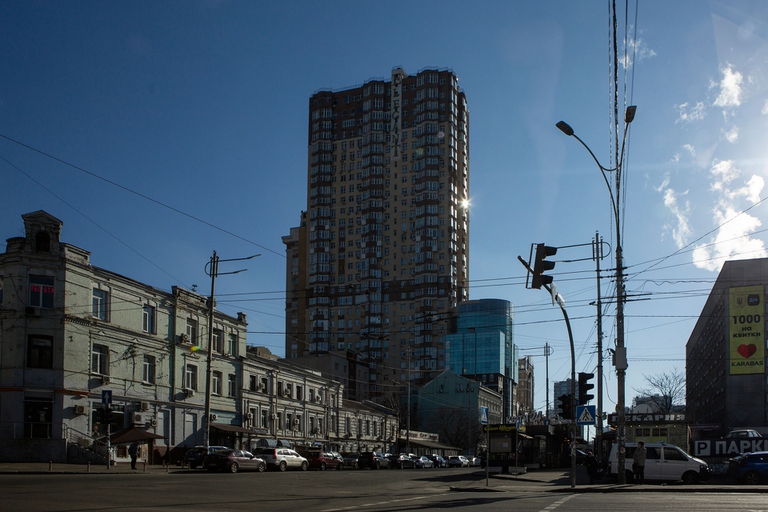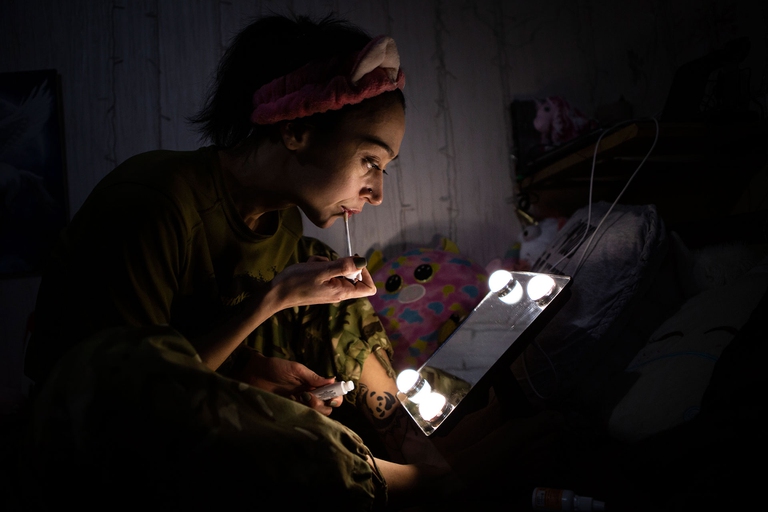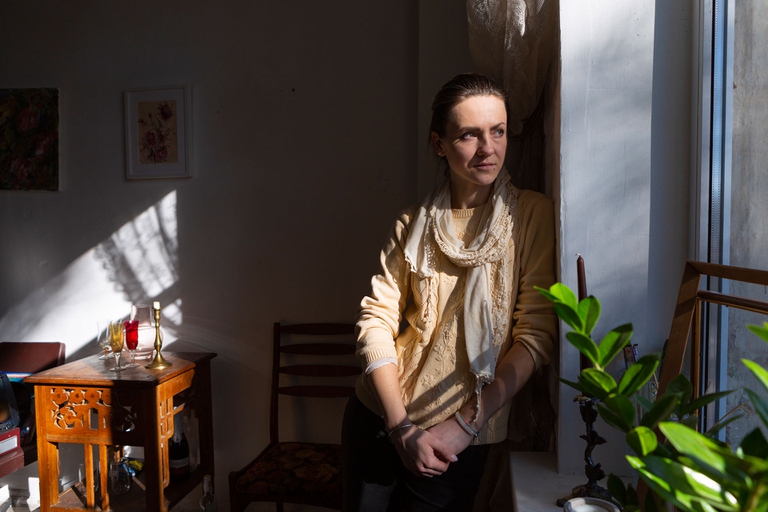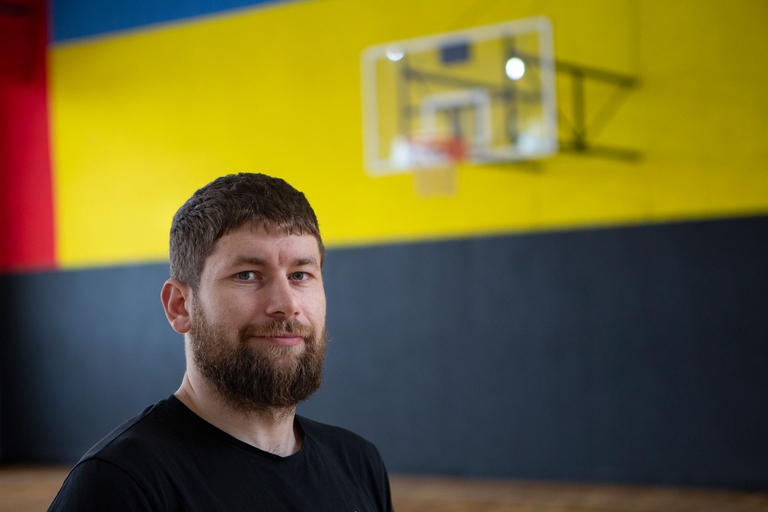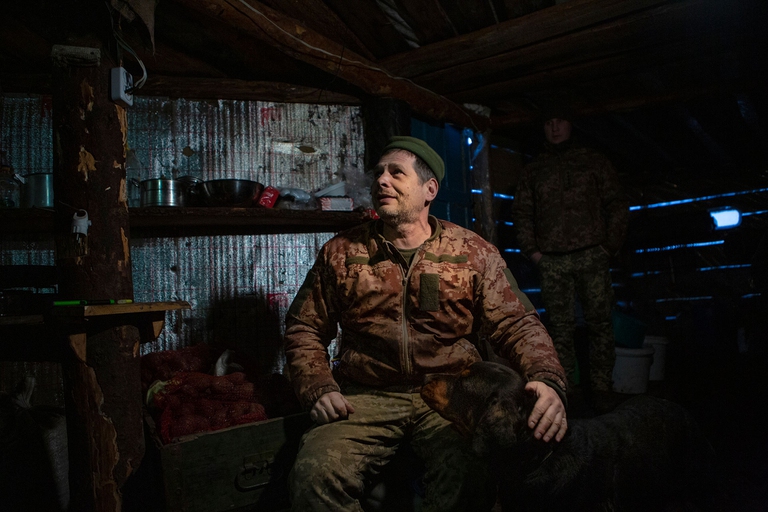
With all eyes currently fixed on the war in Ukraine, Paralympians competing in Beijing can show us the bright side of international cooperation.
The threat of a Russian invasion has changed the lives of Ukraine’s people. The story of the Ukraine crisis as told by men, women, and soldiers.
Karlivka is a village with just over 400 inhabitants, located 12 kilometres from Donetsk. It can be reached from Ukraine’s capital, Kyiv, via an 8-hour train journey to Dnipro followed by a five-hour drive. The roads leading to the village have been battered by the tracks of military vehicles, by mortar fire and rockets, by the impact of 8 years of “low-intensity” crisis in Ukraine. The surroundings are grey, beset by fog and snow, making the journey reflect an aesthetic that matches the current state of tension and worry. In Pisky, at the perifery of the self-proclaimed Donetsk Republic – recognised by Russia on Monday – we find the “Smile” brigade, the snipers belonginging to the fifty-eighth motorised brigade of the Ukrainian Army.
We are welcomed in the kitchen, with some borscht (the popular Ukrainian soup) and the words of Commander Sergej Varakin, spoken to the group of soldiers, men and women, who voluntarily decided to defend their country, offering part of their income to modernise their weapons and equipment. Within the brigade we find Andrew, a 26-year-old soldier who, after three months of training, is now a professional sniper: “When they see us, they’re already dead”. His eyes bely a profound sense of melancholy, underpinned by determination and a desire for the conflict to end as soon as possible.
In Sargeant Nataliya Borisovska‘s room we find plush toys and posters on the wall that give the impression of walking into a teenager’s bedroom. The 33-year-old brings us into her memories of having joined the regular army aged just 20, and – following Russia’s annexation of Crimea – of how she decided to go and fight the separatists and pro-Russia militias on the front line.
Nataliya’s cat is there too, purring affectionately while she puts on her make-up and tells stories of hundreds of killed or injured soldiers. She admits choosing not to remember the anniversaries of those deaths, taking medication to suppress her pain, and continuing her work for the brigade without letting her emotions affect her work. “It’s all stayed inside me, so I paint and write poems to bring out some of the pain I have inside,” she says, stroking a cat that seems blissfully unaware of its important role as a supportive companion.
While the front is still coated in white, in Kyiv the snow from the past few weeks seems to be starting to melt away. Civilians can use Google Maps to access the locations of all the air-raid shelters made available by the city council; some of them are clearly Soviet-built, like real underground war museums. Uliana switches on the record player she has placed in her art gallery and chooses a Domenico Modugno LP as the soundtrack for our interview. She’s not much older than 30 and chose not to enlist so she could stay close to her mother.
Despite the fact that tensions have been high for 8 years now, the events of the past few weeks have been deeply worrying to Uliana. Her home is next to a barracks and she is looking for a place to move to until the risk of a possible bombardment of the capital has passed completely. Uliana works as a translator, helping journalists understand what’s happening in the country and NGOs to take care of veterans, often injured or mutilated, after they return from the front.
In the same building that houses Uliana’s art gallery we also find the painting studio where 21-year-old Anna channels all of her energy into her artwork. Seeing the young woman smile on a sunny winter’s day make the thought of possible large-scale conflict feel even more unjust.
Many of these people experienced the Maidan protests firsthand; after former president Viktor Janukovyč fled the country in March 2014, and following the Odessa massacre, popular sentiment became more united and combative. Along the walls of the Santa Sofia cathedral, over 2,000 photographs memorialise the victims of this war. Many people walk by this endless row of photographs, stopping where their gaze meets a familiar face and brings pangs of grief.
In one of the capital’s sports halls, Tapac spurs on his basketball team to play as well as they can. All the athletes are veterans who have lost one or both legs; they play in wheelchairs, the shouts among teammates mingled with the squealing of tyres as the ball travels across the court. For these men and women, soldiers and volunteers severely injured during the long years of civil war, sport has been a way to rebuild their lives.
An athlete who has attended every training session as far back as anyone can remember is Yana Zinkevych, a former voluntary medic who, at just 20 years old, directed an all-male team of medics and then a medical battalion. She is a decorated war hero who has saved over 200 injured soldiers at the front. In 2015, she lost her leg in a car accident. Now she is a deputy in the Ukrainian parliament and will take part, alongside her team, in the Invictus Games, an international sporting event for war veterans with permanent disabilities.
With Russia’s recognition of the breakaway republics, open war feels imminent. In Schastya, Luhansk, the Ukrainian military’s front line is face-to-face with the so-called Russian separatists, 500 metres from one another. To reach the most advanced position requires travelling across a river on a small military vessel, powered by a silent electric motor, while on land two armed soldiers are on a constant lookout for the presence of enemy combatants. As the boat gets closer to the shore, a snowstorm rages, temporarily covering the colours of the military gear worn by the soldiers.
The press officer is 23, with a camouflaged camera around his neck – the least dangerous weapon at his disposal. His diminutive frame is a stark contrast to his voice as he proudly shows us a sort of sauna, self-built by the battalion to recreate a relaxing and diverting environment during long stints at the front. The sauna, the food, and the many stray dogs in the vicinity seem to represent morale boosters, delicate psychological supports for the most difficult times.
Each of the soldiers on the front lines knows that they will face the highest risk as the conflict intensifies. One of them asks for a smiling portrait to send to his mother, who lives in Italy, in Ancona. “Please tell her I’m well,” he murmurs, making a victory “V” with his fingers, red from the cold. At “Il Siciliano”, a restaurant in Kyiv, chef Michele tries to get information on the ongoing crisis. He opened his restaurant in December, hoping the end of the pandemic would be good for business; now he’s faced with the threat of war. “I won’t leave until the bombs start to fall,” he says, sounding like someone who has made fatalism a way of life. “What do they want to do? Bomb us? Kill us all? It would be carnage… it’s not possible”.
The second part of the story by Michele Cirillo on the Ukraine crisis will be published next Monday, telling the story of the first mental rehabilitation centre for veterans in Ukraine.
Siamo anche su WhatsApp. Segui il canale ufficiale LifeGate per restare aggiornata, aggiornato sulle ultime notizie e sulle nostre attività.
![]()
Quest'opera è distribuita con Licenza Creative Commons Attribuzione - Non commerciale - Non opere derivate 4.0 Internazionale.
With all eyes currently fixed on the war in Ukraine, Paralympians competing in Beijing can show us the bright side of international cooperation.
The United Nations World Food Programme has been awarded the 2020 Nobel Peace Prize for its work in the fight against hunger.
Photojournalist Livio Senigalliesi tells his story, from the Yugoslav Wars to the Balkan Route. And through two videos, one created with journalist Raffaele Masto.
As per tradition after 12 years India held Mahakumbh, the world’s largest spiritual congregation that has been attracting pilgrims from across the globe.
Workers in tea gardens of West Bengal, India, that produces Ctc tea for domestic consumption complain that they have been devoid of basic facilities while political parties make hollow promises during every elections which are never fulfilled.
India is in the middle of the elections, but sadly none of the politicians have uttered a word on man-animal conflict that has been devouring several lives every year.
Manipur, a state in north-east India, is still reeling under the tremors of violence that broke out last year devouring lives and paralyzing the economy.
The government of Tanzania is currently planning to evict more than 80.000 indigenous Maasai people from their ancenstral land
A new UNU-INWEH report on the global bottled water industry reveals the massive scale of this market and the lack of strict quality controls.
